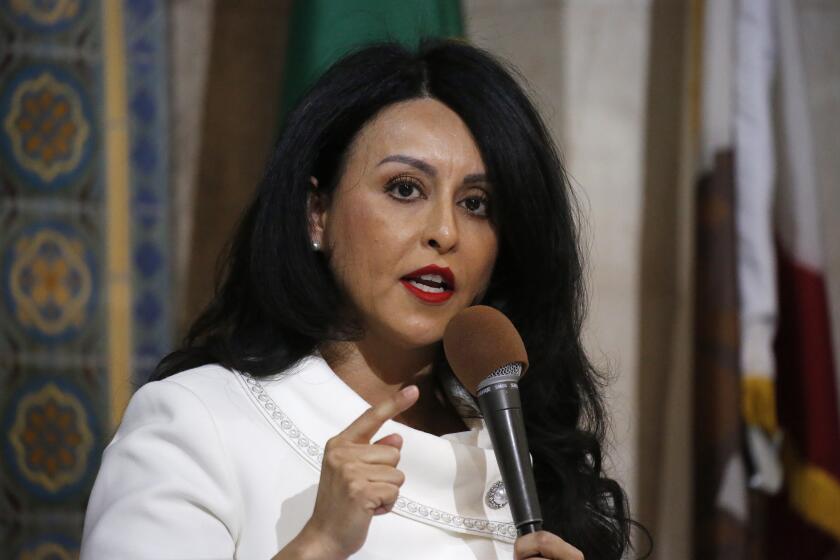Racist audio leak could push L.A. City Hall further left in Nov. 8 election
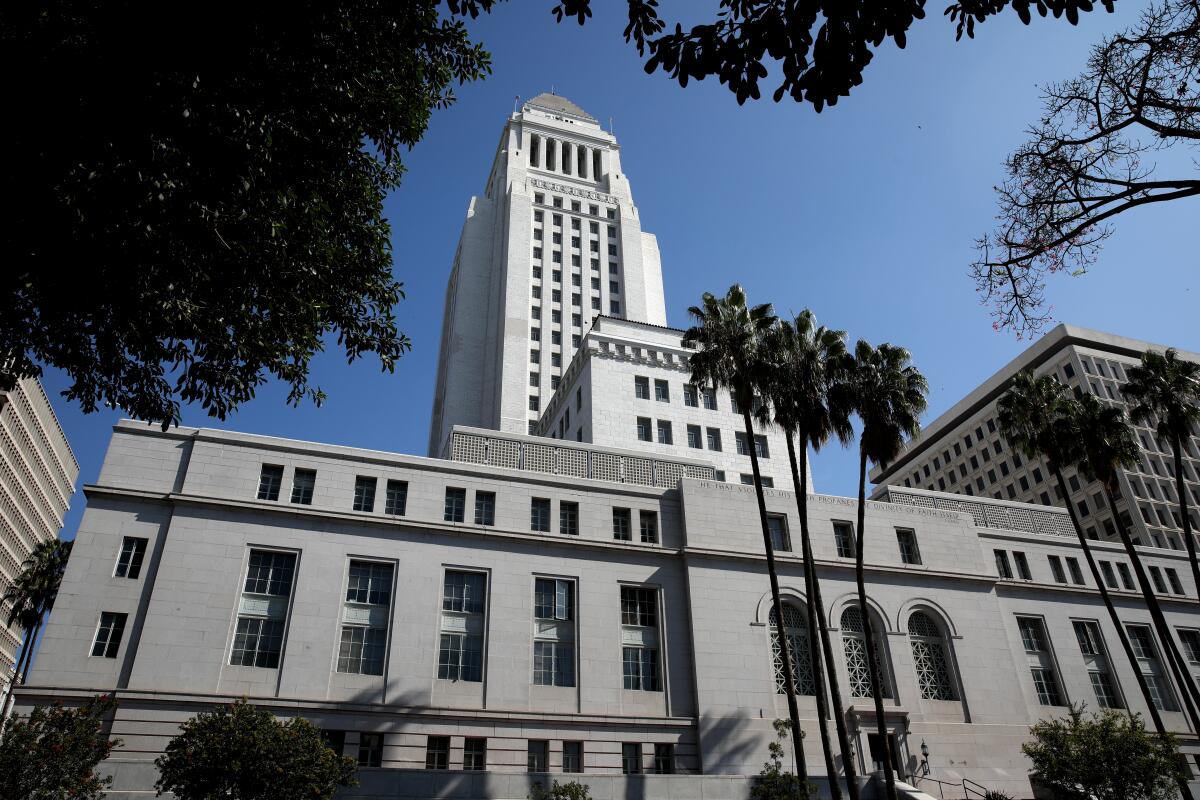
- Share via
Dissatisfaction with Los Angeles City Hall has been simmering for years, with residents growing exasperated over the protracted homelessness crisis, anxious over crime and exhausted by a string of corruption indictments targeting various city leaders.
But publication of an incendiary leaked audio recording less than a month before election day provided yet another damning argument against the city’s political establishment — and perhaps the most explosive.
Angelenos who rarely thought about municipal government turned their eyes toward City Hall in disgust. Residents who were already frustrated are now breathing fire.
Amid the collective fury, left-wing political organizers see a potential tipping point ahead of the Nov. 8 election. Their grassroots movement already had tremendous momentum, with many of their candidates placing first in the June primary election.
Experts say the leak of the recorded October 2021 meeting could cut a number of ways for the campaigns. But close watchers of L.A. politics generally agree that anti-establishment candidates are more likely to benefit. Those insurgents largely occupy the leftmost edge of the political spectrum.
If they prevail, they could easily remake the city in a number of ways, cutting spending for police, enacting more aggressive renter protections and rethinking the city’s approach to homelessness. Several have called for the repeal of a city law barring encampments outside schools, day care centers and other facilities.
None of the L.A. City Council members heard in the audio, all of whom were Democrats, is on the ballot. But all three — Nury Martinez, Kevin de León and Gil Cedillo — wielded tremendous power over homelessness, housing policy and the council itself, and were aligned with some of the more establishment candidates.
However, those divisions —leftists versus the establishment — cleave less neatly in the most closely watched local race: the battle to succeed Mayor Eric Garcetti.
Real estate developer Rick Caruso, the maverick in the race, is a centrist, whereas his more progressive opponent, Rep. Karen Bass, has deep ties to City Hall, labor and the broader political establishment.
“To the extent that it breaks favorably for anyone, it breaks for Caruso,” Loyola Law School professor Jessica Levinson said. “Because he is the outsider who says we have to clean up City Hall, we can’t continue the status quo. ... She represents more of a continuation of current policies than a sea change.”
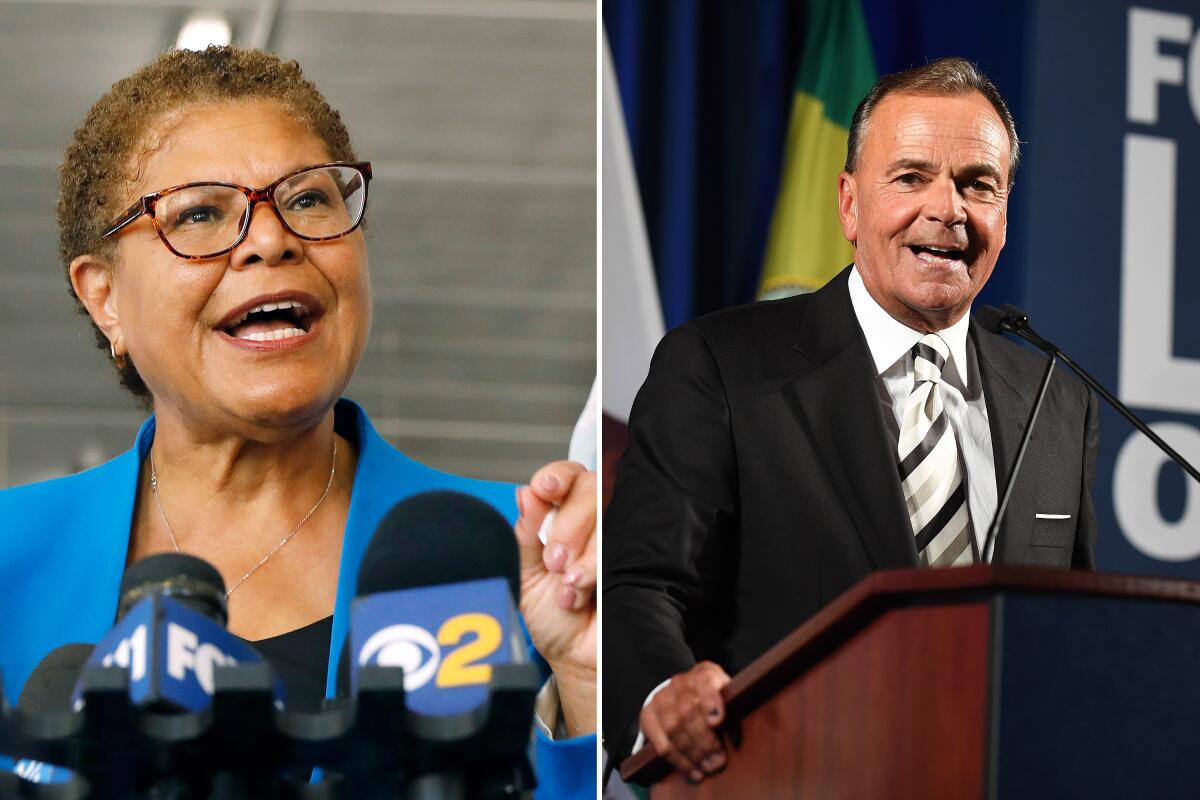
Others say that Bass, a Black woman who spent her career building and leading multiracial coalitions, is ideally positioned to foster consensus amid the wreckage of the leak. On Friday, Bass leaned into that role, appearing with faith and civic leaders to discuss the solidarity they have built in recent decades.
“Four individuals on a tape will not set back race relations [and] will not set back our efforts in unity and coalition building,” she said.
In addition to the mayor’s race, there are six other city contests: city attorney, city controller and four seats on the City Council.
On a council where virtually all members are Democrats, “progressive” is a shifting yardstick.
Many of the so-called establishment candidates argue that they too are solid progressives, working to address economic inequality, climate change and other issues. Some have characterized their leftist opponents as too extreme, particularly on public safety.
Josh Androsky, a consultant for left-wing candidates in two City Council races, said the leak “lays bare what we’ve been saying for years.”
“It completely validates the premise for why these progressive candidates are running in the first place,” he said. “These folks believe that the city is broken, that the incumbents and the insiders can’t fix it because they’re the reason why it’s broken.”
Androsky said that both council candidates he works with — Erin Darling on the Westside and Hugo Soto-Martínez in the Hollywood area — have seen a surge in social media engagement and welcomed new volunteers in the last two weeks.
Martinez, who can be heard making racist comments in the recording, resigned from office three days after The Times reported on the audio. Councilmembers Cedillo and De León, who were also present during the conversation and chimed in at various points, remain in office despite immense pressure to step down. A fourth participant, Ron Herrera, has also resigned from his position as president of the L.A. County Federation of Labor.
Eunisses Hernandez, a progressive challenger closely aligned with Darling and Soto-Martinez, unseated Cedillo in June and is set to take office in December. Her upset victory was heralded by supporters as a bellwether for progressive victory in November.
Audio of Councilmembers Nury Martinez, Kevin de León and Gil Cedillo speaking with labor leader Ron Herrera quickly became a new and incendiary issue in the Nov. 8 election.
Paul Mitchell, one of the state’s most prominent political data analysts, said the overwhelming attention on the leak has made it more difficult for candidates to break through with other messages.
“It’s hard for them to get a lot of traction on issues because it sucks all the oxygen out,” he said.
Manuel Pastor, director of the USC Dornsife Equity Research Institute, said he believes the more progressive council candidates will benefit not just from an anti-establishment mood but also from actual rising progressive sentiment in the city.
Bernard Parks Jr., who spent more than a decade as chief of staff for his father, Councilmember Bernard Parks, warned against reading too much into the tea leaves.
“Trying to get your arms around who’s going to vote — in terms of the electorate, what it looks like, who turns out consistently — is always going to be a puzzle,” Parks Jr. said.
The City Hall veteran said the leaks could be a galvanizing force for insurgent candidates. But he cautioned that the scandal could also depress turnout, causing some to “throw their hands up in total apathy and say, ‘This is why I never vote.’”
City elections have historically been held in odd-numbered years and decided by a relatively small electorate that is whiter, wealthier and older than the city at large. Conventional wisdom dictates, broadly speaking, that higher turnout and a more diverse electorate tends to favor progressive candidates.
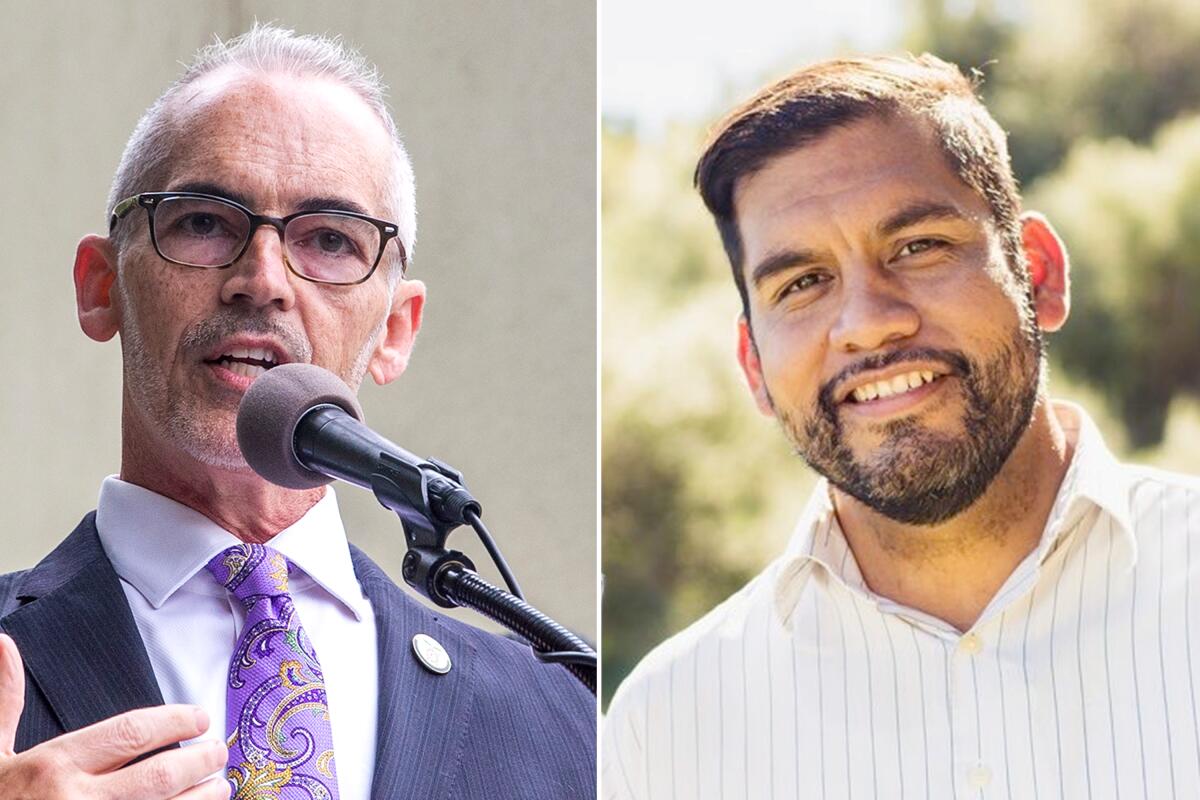
The scandal has figured most prominently in two competitive council races.
In District 13, Soto-Martínez is fighting to unseat Councilmember Mitch O’Farrell, a two-term incumbent whose district spans from Hollywood to Glassell Park.
O’Farrell automatically became the acting council president when Martinez stepped down from her post. He became the public face of the council at a time when public confidence in that body was collapsing, presiding over chaotic meetings disrupted by protesters.
O’Farrell appeared repeatedly before TV news cameras to demand the departure of De León and Cedillo. Following a COVID-19 outbreak on the council floor, he announced he was moving the meetings to Zoom. And when it became clear that Cedillo and De León weren’t going to leave, he stripped them of their committee assignments.
Bill Carrick, a political consultant not involved in the race, said O’Farrell received “enormous” media coverage during his one week as acting president, and succeeded in showing the public strong leadership at a time of crisis.
“He was forceful. He showed a lot of resolve, and he was very clear,” Carrick said.
Still, the scandal also created a fresh line of attack for Soto-Martinez and his allies.
Unite Here Local 11, the hotel and restaurant union where Soto-Martinez served as a longtime organizer, quickly began sending campaign mailers highlighting the fact that O’Farrell served as the No. 2 to Martinez in the council’s leadership. Soto-Martinez said the audio shows the city needs someone new who can fight “corruption and backroom dealings.”
Get the lowdown on L.A. politics
Sign up for our L.A. City Hall newsletter to get weekly insights, scoops and analysis.
You may occasionally receive promotional content from the Los Angeles Times.
But in the wake of the leaked audio, Darling has intensified his attacks on his more conservative opponent, attorney Traci Park, in the race to replace Councilmember Mike Bonin, slamming her for legal work defending the city of Anaheim in a case where a manager was accused of using the “N-word.”
Darling highlighted that case in an attack video, along with the fact that Park had been endorsed by Martinez.
Park, who had been a contract attorney for the city of Anaheim, said she does not condone “racially charged” language.
And she has hit Darling on his own legal work, saying that he represented defendants who have been accused of committing rape, engaging in human trafficking and possessing child pornography, among other things.
If the leak provides momentum for outsider candidates, then that would seemingly benefit Kenneth Mejia, a 31-year-old certified public accountant and community activist running for city controller.
Mejia’s opponent, City Councilman Paul Koretz, was one of the first at City Hall to call for all three colleagues to resign. But he is also seen as an entrenched establishment figure, having served 13 years on the council.
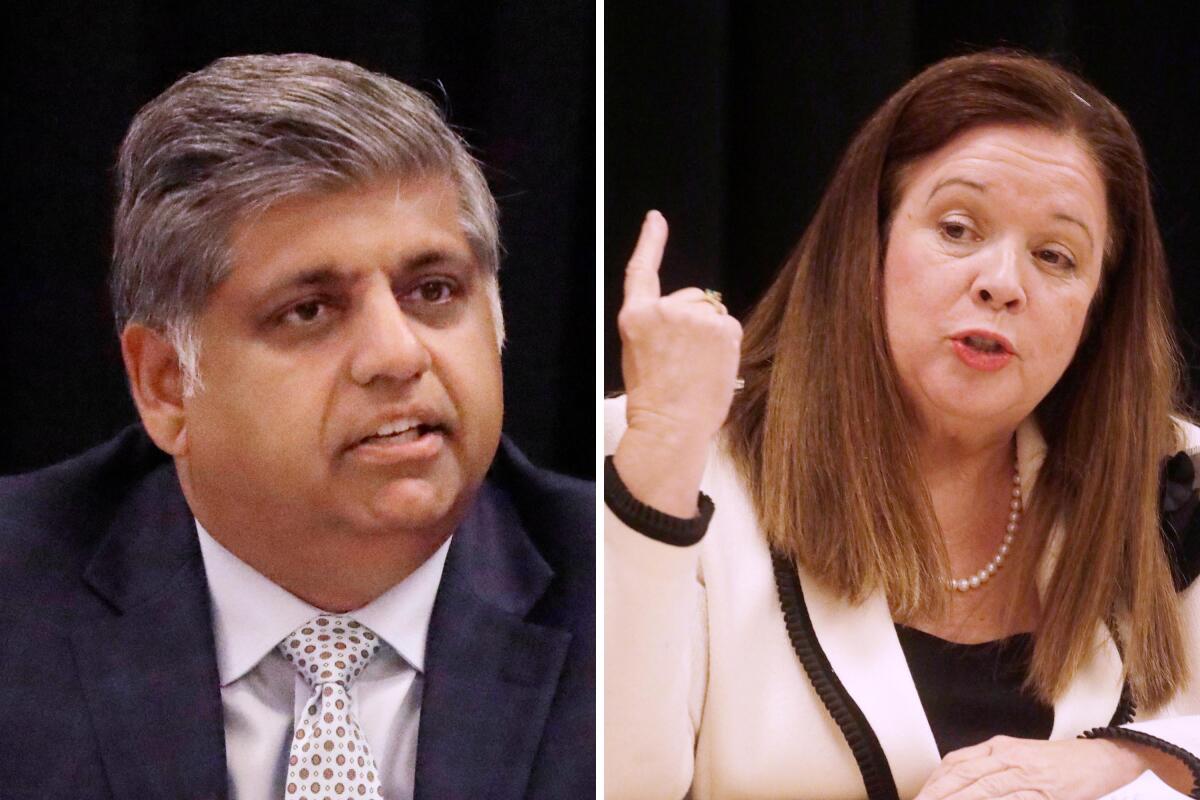
And if the fervor in the wake of fallout benefits progressive candidates more broadly, that could also help Faisal Gill, a civil rights lawyer running well to the left of his opponent, attorney Hydee Feldstein Soto in the race to replace City Atty. Mike Feuer.
Though the circumstances may favor some candidates, all have scrambled to adjust at a time of upheaval.
“Nobody who was planning out their campaign and had this methodical map to the end of [the] election said, ‘Well, then there’s going to be this thing where Joe Biden is going to call on a fifth of the City Council to resign,’” said Mitchell, the data analyst.
More to Read
Sign up for Essential California
The most important California stories and recommendations in your inbox every morning.
You may occasionally receive promotional content from the Los Angeles Times.
